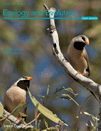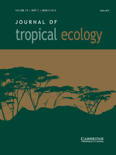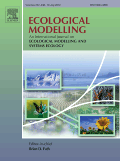
Methods in Ecology and Evolution
metrics 2024
Transforming understanding of ecology and evolution.
Introduction
Methods in Ecology and Evolution, published by WILEY, is a leading journal in the fields of ecology, evolution, and environmental science, with an impact factor that reflects its high-quality research contributions. Since its inception in 2011, this journal has become a cornerstone for researchers and practitioners, offering a platform for innovative methodologies and transformative insights that advance our understanding of ecological and evolutionary processes. With a prestigious Q1 ranking in both Ecological Modeling and Ecology, Evolution, Behavior and Systematics, the journal stands out among its peers, being ranked #28 out of 721 in the Agricultural and Biological Sciences category and #4 out of 41 in Environmental Science. The journal's comprehensive scope encourages interdisciplinary collaboration, making it an essential resource for anyone working at the intersection of ecological research and data modeling. Although it does not offer open access, the wealth of knowledge within its pages is invaluable for developing effective conservation strategies and understanding complex biological systems.
Metrics 2024
 2.64
2.64 6.30
6.30 8.90
8.90 161
161Metrics History
Rank 2024
Scopus
IF (Web Of Science)
JCI (Web Of Science)
Quartile History
Similar Journals

Ecology and Evolution
Advancing the frontiers of ecological and evolutionary science.Ecology and Evolution is a leading open-access journal published by WILEY, dedicated to advancing knowledge in the fields of ecology, evolution, and behavior. Since its inception in 2011, the journal has established itself as a critical platform, garnering a significant impact factor and maintaining a prestigious Q1 ranking in multiple categories, including Ecology, Evolution, Behavior and Systematics, and Nature and Landscape Conservation as of 2023. With its continuous commitment to high-quality research, Ecology and Evolution provides a vital conduit for dissemination among researchers, professionals, and students alike. The journal's open-access model ensures that groundbreaking findings are accessible to a global audience, fostering collaboration and innovation across various ecological and evolutionary disciplines. The editorial team invites submissions that explore the intricate relationships between organisms and their environments, aiming to inspire future research that addresses pressing environmental challenges. The journal's rigorous peer-review process guarantees the integrity and quality of published work, reinforcing its position as a frontrunner in its field.

ECOGRAPHY
Advancing Ecological Insights for a Sustainable FutureECOGRAPHY, published by WILEY, stands at the forefront of ecological and evolutionary research, with an impressive Impact Factor reflecting its esteemed position in the Q1 category of Ecology, Evolution, Behavior, and Systematics. Operating since 1978 and transitioning to a fully Open Access model in 2020, the journal is dedicated to disseminating high-quality research that influences conservation practices and enhances our understanding of ecological dynamics. With an ISSN of 0906-7590 and an E-ISSN of 1600-0587, ECOGRAPHY has garnered a remarkable placement in Scopus rankings, being in the top 4% of its category, achieving an impressive rank of #27 out of 721 in Agricultural and Biological Sciences. Academics from around the globe benefit from the research published in this journal, which seeks to engage and inspire further exploration of ecological systems. For inquiries, ECOGRAPHY can be reached at their UK address: 111 River St, Hoboken 07030-5774, NJ.

Frontiers in Zoology
Leading the charge in open-access zoological scholarship.Frontiers in Zoology is a premier, open-access journal published by BMC that has been a cornerstone of zoological research since its inception in 2004. With a commitment to advancing the field, this journal covers a broad spectrum of topics within Animal Science and Zoology, as well as Ecology, Evolution, Behavior, and Systematics. Recognized for its quality, it holds a distinguished Q1 ranking in both of these categories and ranks within the top percentiles in Scopus, with 87th and 78th percentiles, respectively. Based in the United Kingdom, it provides researchers, professionals, and students with innovative studies and findings that encourage interdisciplinary collaboration and exploration. The journal is dedicated to facilitating the open exchange of scientific knowledge, making it an essential resource for those seeking to stay at the forefront of zoological and ecological sciences.

Frontiers in Ecology and Evolution
Pioneering research at the intersection of ecology and evolution.Frontiers in Ecology and Evolution, published by FRONTIERS MEDIA SA, stands as a premier open-access journal dedicated to the exploration and discourse in the interdisciplinary fields of ecology and evolutionary biology. With its inception in 2013, this journal has rapidly ascended to a prestigious position, securing a Q1 ranking in both Ecology and Ecology, Evolution, Behavior and Systematics categories, reflecting its influential impact in the respective fields. Operative from Switzerland, Frontiers in Ecology and Evolution enables researchers, professionals, and students to access high-quality research without barriers, promoting collaboration and innovation. The journal covers a broad range of topics, from ecological dynamics to evolutionary strategies, facilitating profound insights that drive scientific advancement and understanding. With a remarkable position in Scopus rankings—ranking #218 in Ecology, Evolution, Behavior and Systematics and #145 in Environmental Science—this journal is essential for anyone keen on contributing to or staying updated with contemporary research in ecology and evolution.

Molecular Ecology Resources
Empowering Research at the Molecular-Ecological NexusMolecular Ecology Resources, published by WILEY, is a leading international journal that specializes in the intersection of molecular biology with ecology and evolution. With an impressive impact factor signified by its Q1 status in multiple categories, including Biotechnology, Ecology, Evolution, Behavior and Systematics, and Genetics for 2023, this journal stands as a reputable source of groundbreaking research within the fields of agricultural and biological sciences. Its Scopus rankings are particularly noteworthy, placing it in the top tier of its respective categories, demonstrating its significance in advancing our understanding of molecular ecology. The journal has been committed to fostering high-quality scientific discourse from 2008 to 2024 and offers open access options to enhance its visibility and accessibility. As a researcher, professional, or student in these dynamic fields, engaging with Molecular Ecology Resources means contributing to and staying informed about the latest innovations and methodologies that shape our understanding of the biological world.

ENVIRONMENTAL AND ECOLOGICAL STATISTICS
Empowering researchers with cutting-edge environmental statistics.ENVIRONMENTAL AND ECOLOGICAL STATISTICS, published by SPRINGER, stands as a premier journal dedicated to advancing the fields of environmental science and statistical methodologies. With an ISSN of 1352-8505 and an E-ISSN of 1573-3009, this journal has continually provided a platform for innovative research and interdisciplinary studies since its inception in 1994. Operating from the Netherlands, it enjoys a significant impact within the academic community, reflected in its impressive Q2 rankings across various categories including Environmental Science and Statistics. The journal maintains a strong focus on the application of statistical techniques to ecological and environmental problems, fostering an environment for discourse that is both robust and insightful. Although it does not currently offer open access, the depth and quality of research published within its pages position it as a vital resource for researchers, professionals, and students alike, eager to understand and address the complexities of environmental data analysis up to the year 2024.

JOURNAL OF TROPICAL ECOLOGY
Driving Innovation in Ecological UnderstandingThe JOURNAL OF TROPICAL ECOLOGY, published by Cambridge University Press, serves as a pivotal platform for advancing knowledge in the field of ecology, particularly within tropical environments. With an ISSN of 0266-4674 and an E-ISSN of 1469-7831, this esteemed journal has been a key resource since its inception in 1985, maintaining a focus on empirical research that addresses the complexities of tropical ecosystems. It holds a respectable Q3 ranking in the Ecology, Evolution, Behavior and Systematics category as of 2023, indicating its significant contribution to the field, although it remains within the competitive mid-range. The journal publishes original research, reviews, and methodological articles that illuminate the rich biodiversity and unique ecological processes of tropical regions, fostering a deeper understanding of conservation challenges. Accessible from the United Kingdom, this publication appeals to a diverse audience of researchers, professionals, and students keen on exploring ecological dynamics in tropical settings, and plays a crucial role in promoting scientific discourse and collaborative efforts aimed at preserving our planet's vital ecosystems.

OECOLOGIA
Advancing Ecological Insights for a Sustainable FutureOECOLOGIA is a prestigious journal dedicated to the interdisciplinary fields of ecology, evolution, behavior, and systematics, published by Springer. Established in 1968, this journal has consistently contributed to the scientific community, maintaining a strong impact factor reflected in its Q1 ranking within its category for 2023, and an impressive 79th percentile among 721 journals in the Scopus rank for Agricultural and Biological Sciences. With a commitment to advancing ecological knowledge and fostering innovative research, OECOLOGIA serves as a vital platform for researchers, professionals, and students exploring complex ecological dynamics and evolutionary processes. Although it does not offer open access, the journal remains dedicated to high-quality, peer-reviewed publications that inspire and inform the next generation of ecological science. For those interested in the latest trends and significant findings in biology and ecology, OECOLOGIA is an essential resource that continues to shape the discourse and understanding in these critical fields.

ECOLOGICAL MODELLING
Transforming ecological data into actionable knowledge.ECOLOGICAL MODELLING, published by Elsevier, is a premier international journal dedicated to advancing the field of ecological modeling. Established in 1975, this reputable journal has consistently served as a vital platform for researchers, professionals, and students alike, reflecting the dynamic nature of ecological research and its applications. With an impressive impact factor, currently placing it in the Q2 quartile for Ecological Modeling and in the prestigious Q1 quartile for Ecology, ECOLOGICAL MODELLING ranks prominently in the scientific community, positioned at #91/461 in Environmental Science - Ecology and #14/41 in Environmental Science - Ecological Modeling according to Scopus rankings. The journal seeks to publish high-quality, interdisciplinary research that enhances understanding and predictive capacity regarding ecological processes and their integration into real-world applications. While the journal does not currently offer open access, it remains a cornerstone for knowledge dissemination within the ecological community, ensuring that your valuable research reaches a wide audience.

Nature Ecology & Evolution
Fostering transformative ideas for a sustainable future.Nature Ecology & Evolution is a premier journal that serves as a cornerstone for cutting-edge research in the dynamic fields of ecology, evolution, behavior, and systematics. Published by NATURE PORTFOLIO, this journal, with the ISSN 2397-334X, emphasizes high-quality, impactful studies that advance our understanding of ecological interactions and evolutionary processes. With an impressive Scopus ranking placing it in the 99th percentile—#6 out of 721 in Ecology, Evolution, Behavior and Systematics and #5 out of 461 in Environmental Science Ecology—it is classified as a Q1 journal, highlighting its significance in the research community. Established in 2016, it continues to foster an open dialogue among researchers and practitioners while facilitating the dissemination of transformative ideas that shape environmental policy and conservation strategies. While access to articles is restricted, the journal's robust impact factor underscores its relevance in scholarly discourse. Researchers, professionals, and students are encouraged to engage with the current trends and discoveries published in this leading journal, which thrives on addressing the challenges and complexities of our natural world.